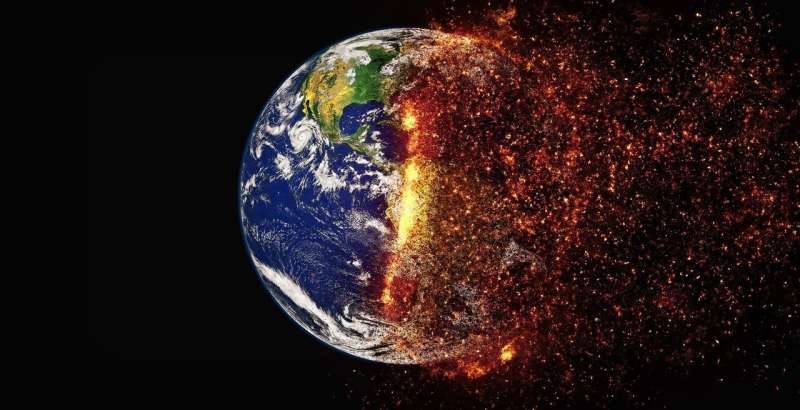This article has been reviewed according to Science X's editorial process and policies. Editors have highlighted the following attributes while ensuring the content's credibility:
fact-checked
trusted source
proofread
Climate-changing human activity could lead to 1 billion deaths over the next century, according to new study

If global warming reaches or exceeds two degrees Celsius by 2100, University of Western Ontario's Joshua Pearce says it is likely that mainly richer humans will be responsible for the death of roughly one billion mainly poorer humans over the next century.
The oil and gas industry, which includes many of the most profitable and powerful businesses in the world, is directly and indirectly responsible for more than 40% of carbon emissions—impacting the lives of billions of people, many living in the world's most remote and low-resourced communities.
A new study proposes aggressive energy policies that would enable immediate and substantive decreases to carbon emissions and recommends a heightened level of government, corporate and citizen action to accelerate the decarbonization of the global economy, aiming to minimize the number of projected human deaths.
"Such mass death is clearly unacceptable. It's pretty scary really, especially for our children," said Pearce, Western's John M. Thompson Chair in Information Technology and Innovation and lead author of the study. "When climate scientists run their models and then report on them, everybody leans toward being conservative, because no one wants to sound like Doctor Doom. We've done that here too and it still doesn't look good."
The major review of more than 180 articles from scientific literature, co-authored by Richard Parncutt from the University of Graz (Austria), was published in Energies.
Pearce and Parncutt found the peer-reviewed literature on the human mortality costs of carbon emissions converged on the "1,000-ton rule," which is an estimate that one future premature death is caused every time approximately 1,000 tons of fossil carbon are burned.
"Energy numbers like megawatts mean something to energy engineers like me, but not to most people. Similarly, when climate scientists talk about parts per million of carbon dioxide, that doesn't mean anything to most people. A few degrees of average temperature rise are not intuitive either. Body count, however, is something we all understand," said Pearce, a Western Engineering and Ivey Business School professor.
"If you take the scientific consensus of the 1,000-ton rule seriously, and run the numbers, anthropogenic global warming equates to a billion premature dead bodies over the next century. Obviously, we have to act. And we have to act fast."
Pearce, an expert in energy policy, hopes by changing and challenging the language and metrics of global warming, more policymakers and industry leaders will better understand the hard truths about the world's reliance on fossil fuels.
"As predictions of climate models become clearer, the harm we are doing to children and future generations can increasingly be attributed to our actions," said Pearce.
When this direct correlation is recognized, greenhouse gas emissions liabilities can no longer be ignored. The study found that to limit these enormous future liabilities and save many human lives, humanity needs to stop burning fossil fuels as quickly as possible by following a more aggressive approach to energy efficiency and renewable energy.
According to the study, energy policy to mitigate climate change should be prioritized in the following main areas:
- Improved energy conservation and efficiency and the rational use of energy, supported by government programs for industrial, agricultural, transportation, residential and household users.
- Complete replacement of high carbon fuels (coal, oil and natural gas) by zero carbon content fuels (i.e., hydrogen, electricity, etc.) from renewable energy sources like hydropower, wind, geothermal, biomass and solar, scaled and distributed to create resilient power networks.
- Development of technologies for carbon waste management and natural capture and storage of CO2 including carbon sequestration and regenerative agriculture.
- Replacement of carbon subsidies by carbon taxes.
"To be clear, predicting the future accurately is hard. The 1,000-ton rule is only an order of magnitude best estimate. The number of caused deaths will likely lie between a tenth of a person and 10 people per 1,000 tons. Regardless, the bottom line that we need to act fast is still crystal clear," said Pearce.
"Global warming is a matter of life or death for a billion people. Almost everyone agrees that every human life is valuable, independent of age, cultural or racial background, gender or financial resources. Therefore, the energy transition will have to change much, much faster, starting now."
More information: Joshua M. Pearce et al, Quantifying Global Greenhouse Gas Emissions in Human Deaths to Guide Energy Policy, Energies (2023). DOI: 10.3390/en16166074
Provided by University of Western Ontario





















